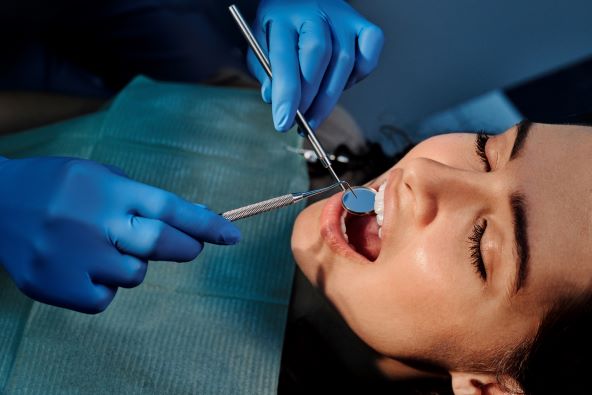Differences between tooth infection and nerve pain
Have you ever experienced a sharp and shocking pain in your tooth? Are you worried about your tooth pain and dental health? You are not alone. Many people experience these types of pain and discomfort. For example, some people experience sharp and shocking pain in the internal part of their teeth. Some people feel pain in the jaw and neck. On the basis of pain, it is divided into two parts: tooth infection and nerve pain. For proper treatment of infection and pain, it is important to understand the difference between them. In this blog post, you can easily understand the difference between a tooth infection and nerve pain in simple terms.
Tooth Infections
Tooth infections are also known as dental abscesses or cavities. It occurs due to germs and bacteria in the tooth pulp; these bacteria enter from enamel to dentin and then search to pulp. These bacteria multiply in the tooth pulp and cause serious tooth pain and discomfort. Major factors in tooth infection are
Poor oral hygiene
If you are not brushing your teeth twice a day and flossing your teeth regularly, It leads to the growth of bacteria and plaque. These bacteria cause tooth infections.
Sugar and Acid Consumption
Excessive consumption of sugar, acidic foods, and beverages can damage a tooth and create a hole in the tooth. Bacteria enter through holes and cause infection, even leading to the decay of teeth.
Dental Trauma
Injury and fracture affect the outer layer of a tooth and expose the inner layer. Due to the exposed nerves, the risk of infection is increased.
Untreated Cavities
If you are not treating cavities at the right time, it can increase the growth of bacteria.
Signs and Symptoms of Tooth Infection
Tooth infection has some specific symptoms that distinguish it from a nerve pain:
Intense pain
A tooth infection causes intense and throbbing pain in the tooth, and sometimes it spreads out to the jaw, ear, or neck. This pain is constant and often increases over time.
Swelling and Inflammation
This infection causes swelling of the gums and mouth.
Sensitivity to Temperature
Tooth infection increases sensitivity to temperatures like hot and cold.
Pus Formation
In advanced cases, the tooth pulp is filled with pus.
Fever and malaise
This infection can cause fever, fatigue, and general malaise.
Diagnosis and Treatment of Tooth Infections
To diagnose a tooth infection, consult a trained dentist. In the examination of tooth infections, most dentists recommend x-rays. After diagnosis, some treatment options are:
Antibiotics
If infection is at the initial stage, doctors prescribe antibiotics to treat and control infection.
Root canal therapy
For advanced infections, root canal therapy is best. During therapy the infected pulp is removed, clean the tooth from the inside, and seal it to prevent further infections.
Tooth Extraction
In severe stages of infection, tooth extraction is necessary to get relief from pain and discomfort. In this case, the patient loses their teeth.
Nerve Pain
Nerve pain in the tooth is also known as pulpitis or dental pulp pain. Unlike a tooth infection, dental nerve pain occurs due to problems with the dental nerve rather than a bacterial infection. Major factors in tooth and nerve pain:
Dental Trauma
Due to a face injury, sometimes nerves below the teeth and jaw are damaged and cause nerve pain.
Dental Procedures
In some cases, dental procedures like root canal therapy or tooth extractions can damage or irritate the nearby nerves, which causes nerve pain.
Bruxism
Teeth grinding or clenching, known as bruxism, can put excessive pressure on nerves in the jaw, causing nerve pain.
Sign and Symptoms of Nerve Pain
Nerve pain has some specific symptoms that distinguish it from a dental infection:
Electric Shock-like Pain
In tooth nerve pain, the patient feels a sharp, shooting, or electric shock-like pain that goes away and comes back suddenly.
Tingling or Numbness
Along with this pain, you may feel tingling or numbness.
Increase over time
This pain increased over time with actions like chewing, talking, and touching the affected area.
Diagnosis and treatment of nerve pain
Diagnosing dental nerve pain is difficult because there are many dental problems. It is important to consult a trained dentist. For dental nerve pain, most dentists recommend an X-ray and a dental sensitivity test. After the diagnosis of nerve pain, some treatment options are:
Nerve Blocks
In a nerve block treatment, a dentist directly applies an injection to the affected area to provide relief from pain.
Dental Appliances
When you are dealing with a problem like bruxism, doctors recommend using a mouthguard to reduce pressure on nerves.
Surgical Interventions
In some serious cases, surgery is crucial to remove and repair dead nerves.
Final words
Tooth infections and nerve pain both cause dental pain and discomfort. But they happen for different reasons; their causes, symptoms, and even treatment approaches are different. So, understanding the difference between them is crucial for appropriate treatment and getting relief from pain.
If your teeth are hurting, it’s important to consult with a dentist as soon as possible. A dentist will check your teeth and do some tests to figure out the cause of dental pain. Then recommend appropriate treatment to fix your dental problem. Remember, getting help early can stop things from getting worse and keep your teeth healthy.


Your articles are extremely helpful to me. May I ask for more information?
May I request more information on the subject? All of your articles are extremely useful to me. Thank you!
How can I find out more about it?
Thank you for your post. I really enjoyed reading it, especially because it addressed my issue. It helped me a lot and I hope it will also help others.
Your articles are extremely helpful to me. Please provide more information!